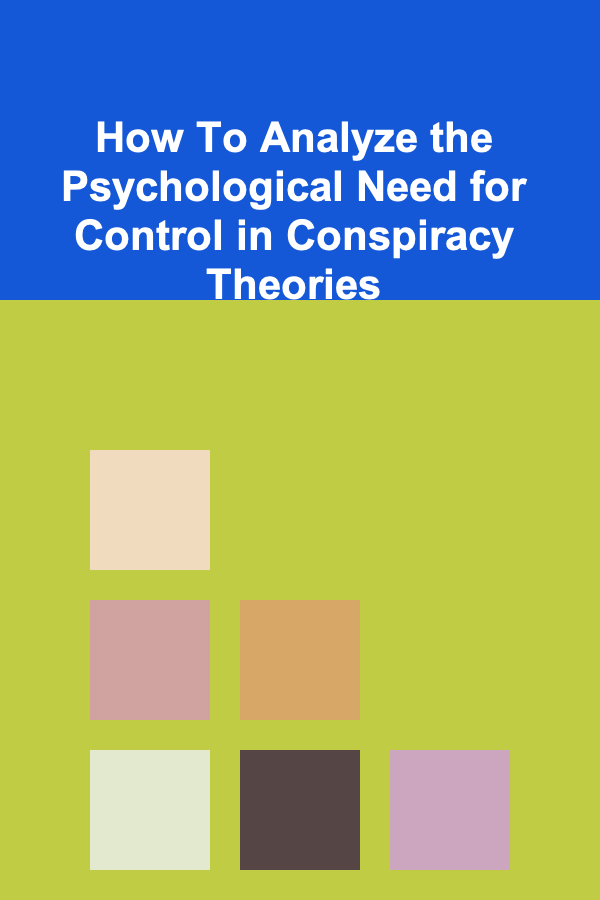
How To Analyze the Psychological Need for Control in Conspiracy Theories
ebook include PDF & Audio bundle (Micro Guide)
$12.99$6.99
Limited Time Offer! Order within the next:

Conspiracy theories are often dismissed as the result of paranoia, misinformation, or the uncritical acceptance of alternative narratives. However, when we look at the psychology behind why people are drawn to conspiracy theories, we find that they frequently fulfill a deeper, more fundamental psychological need---the need for control. This article will explore how the psychological need for control influences individuals' attraction to conspiracy theories, and why these beliefs become particularly compelling in uncertain, threatening, or confusing environments. We will examine this through psychological theories, research findings, and a thorough analysis of the cognitive, emotional, and social factors that contribute to the development of conspiracy thinking.
The Need for Control: A Psychological Overview
At the core of many psychological processes is the need for control. Humans are inherently motivated to feel that their lives and environments are predictable and manageable. This need for control is a fundamental aspect of human psychology, and when it is thwarted or threatened, individuals may experience anxiety, stress, or even a sense of helplessness. Theories in psychology, such as the Control Theory and Need for Closure theory, help explain why control is so central to human functioning.
Control Theory
Control theory, developed by psychologist William Glasser, posits that individuals seek to gain control over their environment and themselves in order to meet basic needs such as safety, comfort, and fulfillment. When people feel in control, they are more likely to feel confident and secure. However, when they experience a loss of control---whether due to external events, uncertainty, or social instability---they may struggle with feelings of powerlessness and vulnerability. These feelings of helplessness often prompt individuals to engage in behaviors that restore their sense of control.
Need for Closure
The concept of "need for closure" was introduced by psychologist Arie Kruglanski in the 1990s. It refers to an individual's desire to arrive at a clear, definitive understanding of a situation, especially in the face of ambiguity or uncertainty. People with a high need for closure are more likely to make snap judgments and seek out simple, straightforward explanations that help resolve confusion or discomfort. This need can be a driving factor in the appeal of conspiracy theories, which often provide clear, definitive answers to complex or perplexing events.
Conspiracy Theories: A Source of Control
Conspiracy theories offer a sense of control in the face of uncertainty. They provide individuals with a structured narrative that explains events in ways that are often simpler and more comprehensible than official or mainstream explanations. By offering an alternative story, conspiracy theories allow people to regain a sense of mastery over their environment, transforming ambiguity and confusion into a narrative that feels more predictable and manageable.
Cognitive Appeal of Conspiracy Theories
From a cognitive standpoint, conspiracy theories often appeal to individuals who are experiencing feelings of uncertainty or helplessness. These theories provide a sense of order and control by attributing events to the actions of powerful, hidden forces. This offers a clear and simplistic explanation for otherwise complex phenomena. For example, when faced with a traumatic or shocking event, such as a terrorist attack or a public health crisis, conspiracy theories provide an alternative to the official narrative that may be perceived as incomplete, ambiguous, or unsatisfactory. The conspiracy theory provides a sense of certainty and closure, as it presents a more definitive explanation.
Moreover, conspiracy theories often reinforce the belief that the world is controlled by unseen forces, which can lead to a feeling of personal empowerment for those who believe they have uncovered the "truth." This belief that they are in possession of privileged knowledge sets them apart from the general public and creates a sense of superiority and control over others who are "in the dark."
Emotional Factors in the Need for Control
The psychological need for control is not solely driven by cognitive factors but is also deeply emotional. Research has shown that people who feel powerless or insecure are more likely to turn to conspiracy theories as a way to regain a sense of power. The emotional pull of conspiracy thinking lies in its ability to offer a sense of certainty and relief from feelings of anxiety, fear, or powerlessness.
One of the key emotions associated with the attraction to conspiracy theories is fear. When individuals feel vulnerable or threatened by events they cannot control---such as the spread of disease, political instability, or economic crises---conspiracy theories provide an outlet for these emotions. By blaming powerful, hidden agents for the turmoil, conspiracy theories provide a sense of external locus of control, which is comforting in the face of overwhelming fear. The more a person feels threatened or uncertain, the more likely they are to seek out these theories to restore their sense of control.
Another important emotion linked to conspiracy theory belief is mistrust. Those who feel a lack of control may develop a mistrust of authority, institutions, and mainstream narratives. This mistrust is often exacerbated when official explanations fail to provide satisfying answers, or when individuals perceive these explanations as manipulative or deceitful. In such situations, conspiracy theories offer an alternative that aligns with the individual's desire for control over their environment and their perception of hidden motives in others.
The Role of Social Identity in Conspiracy Theories
Social identity also plays a significant role in the psychological need for control within conspiracy thinking. The social identity theory, proposed by Henri Tajfel and John Turner, suggests that individuals derive a sense of self-worth from their membership in social groups. When people feel that their identity is under threat---whether due to political instability, social unrest, or cultural change---they may seek refuge in conspiracy theories that align with the values and beliefs of their social group.
Conspiracy theories can create a sense of in-group solidarity among those who believe in them. By promoting a narrative that the "truth" is being suppressed by the mainstream, conspiracy theorists can reinforce a sense of belonging to a select group of individuals who are "in the know." This sense of belonging can provide a comforting psychological balm, as individuals feel that they are part of a community that understands the "real" workings of the world, as opposed to those who are naïve or misled.
Furthermore, conspiracy theories often provide a sense of moral superiority. By believing in a conspiracy, individuals can perceive themselves as more enlightened or informed than the general public. This can strengthen their identity and sense of control, particularly when they view those who reject the conspiracy theory as part of the problem. The belief in an alternative narrative fosters a strong sense of "us versus them," which is psychologically rewarding for individuals who feel that their worldview is under siege.
The Impact of Threats on the Need for Control
Research consistently shows that the psychological need for control becomes heightened in times of threat or crisis. During periods of social upheaval, political instability, or global pandemics, individuals experience a surge in anxiety and uncertainty. These feelings of vulnerability may drive them to search for explanations that restore their sense of control. Conspiracy theories, in this context, become a tool for managing anxiety and fear.
The Role of Uncertainty in Conspiracy Beliefs
Uncertainty is a major driver of conspiracy thinking. According to the uncertainty-identity theory, uncertainty about the world and one's place in it increases the likelihood of adopting conspiracy theories as a way to reduce discomfort and anxiety. When faced with ambiguous or unpredictable situations, such as the rapid spread of a new virus or the collapse of political institutions, individuals may seek explanations that provide certainty, even if those explanations are unfounded or exaggerated.
In these situations, conspiracy theories offer a comforting sense of closure and certainty. They provide simple answers to complex questions, offering a clear-cut explanation for why things have gone wrong. This can be particularly appealing during times of crisis, as individuals seek to regain control over their environment and make sense of seemingly chaotic events.
Conclusion: Control and Conspiracy Theories as Psychological Coping Mechanisms
The psychological need for control plays a central role in the attraction to conspiracy theories. These beliefs provide a sense of order and predictability in an otherwise uncertain and chaotic world. By offering clear and simple explanations for complex events, conspiracy theories allow individuals to regain a sense of control over their environment, particularly during times of crisis, uncertainty, or fear.
The cognitive, emotional, and social factors that drive belief in conspiracy theories are deeply intertwined with the human need for control. From the cognitive desire for certainty to the emotional comfort provided by the identification of hidden forces, conspiracy theories serve as a psychological coping mechanism for those who feel vulnerable, threatened, or powerless. Understanding these psychological motivations can help us better address the appeal of conspiracy theories and develop more effective ways of promoting critical thinking, media literacy, and resilience in the face of uncertainty.
By recognizing the deep-seated psychological need for control that fuels conspiracy theory belief, we can approach the topic with empathy and a greater understanding of the complex emotional and cognitive dynamics at play. Rather than dismissing those who believe in conspiracy theories as irrational or paranoid, it is essential to consider the underlying psychological processes that drive their beliefs, and to find ways to offer more constructive and empowering alternatives to help individuals regain a sense of control in a complex and uncertain world.

Beginner Guide: The Guide to Effective Communication
Read More
How to Build Wealth in Your 40s and 50s for a Comfortable Retirement
Read More
How to Set Up a Family Scrapbooking Station for Memories
Read More
How to Stage Your Home to Create a Sense of Space
Read More
How to Understand Small Business Taxes
Read More
The Public Affairs Manager's Guide: Mastering Strategic Communication and Advocacy
Read MoreOther Products

Beginner Guide: The Guide to Effective Communication
Read More
How to Build Wealth in Your 40s and 50s for a Comfortable Retirement
Read More
How to Set Up a Family Scrapbooking Station for Memories
Read More
How to Stage Your Home to Create a Sense of Space
Read More
How to Understand Small Business Taxes
Read More